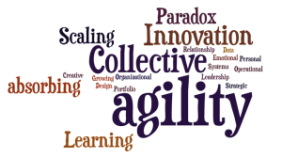 There is this constant set of discussions about changing structures and models to become more adaptive, agile, lean, flexible and fluid; to react and deal with the increasing turbulence occurring all around us.
There is this constant set of discussions about changing structures and models to become more adaptive, agile, lean, flexible and fluid; to react and deal with the increasing turbulence occurring all around us.
We all sense this pressing need to react and become more responsive, becoming more adaptive to changing environments and business challenges, that are often unknown, unexpected, or not yet explored or exploited. The question is how much and how far can we go?
Organizations are facing increasing a dilemma in how they organize and manage within their systems and structures.They are being forced to deal in increasingly complexity and environmental turbulence and ‘adapting the appropriate response’ remains increasingly a difficult one to master, within the existing regime they have in place.
On the one hand the value in stability is still essential; working within specific routines and practices gives a clear ‘path dependence.’ This stability allows for efficiencies and effectiveness to be constantly at practice, constantly building the problem-solving processes, to master tasks in complex environments to resolve ‘known’ problems in ‘given’ ways but this relies on this stable flow and that is not the case of much of what we have to handle today.
We are being challenged more and more on this efficiency and effectiveness focus. It is often not working to deliver the results. We are missing a new way of working. Continue reading “Achieving a Level of Fluidity in Innovation”


